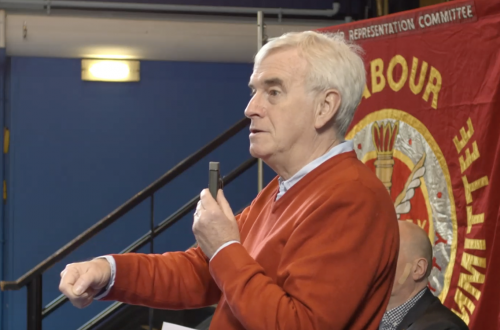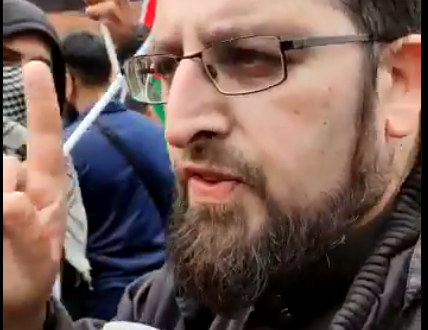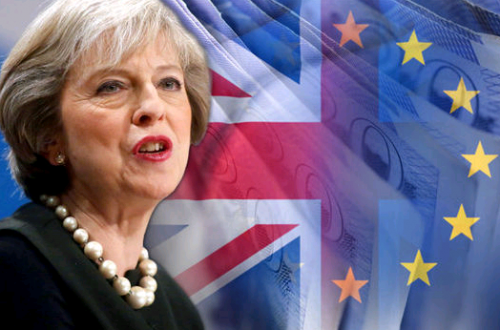I’m writing this following a brief BTL discussion about The Death of Klinghoffer, John Adams’ opera based on the hijacking of the Achille Lauro, and the murder of Leon Klinghoffer, an American tourist. That conversation was prompted by the opera’s recent ENO revival. Here is a link to the libretto (pdf), for reference. I didn’t mean to write at such length, but I’ll just mention the fact that I also briefly touch on An Education, in case anyone was interested in discussing the relationship between that film and antisemitism, but doesn’t want to read 2000 words about the opera!
Whereas some find this opera ‘even-handed’, others have deemed it antisemitic, and there have been protests against the new production. It’s difficult to diagnose racism (or its absence) in a complex libretto (written by Alice Goodman) which doesn’t have a narrator. Who are we meant to side with? A character might say something racist, but that, surely, just helps cast him as a ‘baddie’ – doesn’t it? Does the beauty of the language, or music, make an ugly situation more or less horrifying? Does it lull us into approving of the terrorists or increase our disgust? And was that (however you answered) the writer’s intention?
The two opening choruses gesture towards even handedness by showing both the Palestinians and Jews as victims. But by pitting the Nakba against the Holocaust and ignoring all the other events which led to the creation of Israel, it seems pretty clear who the film want us to side with. (This is one of the problems with Seven Jewish Children too of course.) It is possible to feel great sympathy for the many ordinary Palestinians who lost their homes/lives in 1948, and yet utterly reject the idea that there is any meaningful equivalence between those events and the Holocaust.
These are the opening words:
My father’s house was razed
In nineteen forty-eight
When the Israelis passed
Over our street.
In Penny Woolcock’s 2003 film we see terrified Palestinians, including a little girl, running for their lives. At the end of the chorus the music becomes harsher, and perhaps could be said to contribute ‘balance’, by hinting at the pitiless intensity of the younger generation, the ruthlessness of the terrorists’ plan.
I read here that this chorus, in the ENO production, is “set against a backdrop of graffiti daubed on a concrete wall, intriguingly proclaiming “Warsaw 1943, Bethlehem 2005.”One could argue that the ‘voice’ of the graffiti writer has no more validity or authorial approval than that of any other character in the play – but when it’s supported by the very selective use of material in the opening choruses, it’s hard to make that case too strongly. The production is intensifying an invitation, just implicit in the opera itself, to draw a parallel between Israel and the Nazis.
I’m not sure if I have quite understood the next chorus, the chorus of Jewish exiles. But I think this is meant to be the voice of Israel, imagined as an old woman, talking to the Jews.
“I am an old woman. I thought you
were dead. …
A woman comes in to keep the place looking
occupied.”
Let us, when our lust is exhausted for the day,
Recount to each other all we endured since we
Parted.
There is thus a rather queasy image of a man having sex with a very old woman, implying that the relationship between the Jews and Israel was played out, moribund, and that to revive it was perverse. I assume the dismissive reference to the woman coming in to make the place look occupied (a charged word) is meant to be a reference to the Palestinian inhabitants of (what is now) Israel. If this is meant to represent advocacy for Jews/Zionists and help make this a ‘balanced’ opera– it’s not doing a very good job. The words of the aria in which Hagar is described promising a country to her sons, by contrast, are far more lyrical and appealing.
In the film, at this point, we see the horrors of the Holocaust, and then see refugees coming and taking over the same houses we saw being abandoned by the Palestinians. We are shown a woman slowly wiping out Arabic script from a blackboard, just in case we haven’t got the message, and a young couple having sex in the bedroom they have just taken over. As we flashforward to the Achille Lauro we see the same couple in later life, juxtaposed with the Klinghoffers, another older couple in bed together.
This association, in the film, between Israel/Israelis and the American Klinghoffers, contributes to the opera’s implication that the Klinghoffers are something more than simple bystanders, that being ‘even-handed’ involves creating a strange parity between them and the terrorists rather than simply acknowledging that there has been undeserved suffering on both sides in I/P.
The opera’s supporters have pointed out that people should not criticise the depiction of the Klinghoffers as flawed, as no one is perfect. That’s true, but somehow that human imperfection we all share is put into the scales as though it could conceivably counterbalance the murderous criminality of the terrorists. When watching a play like Webster’s The Duchess of Malfi it may be fine to discuss calmly whether the Duchess is in some way responsible for her brutal murder or reflect on the fascinating complexity of Bosola, the character who presides over her death, and note that he too is a victim in a sense. But such discussions seem more questionable when we are talking about real people whose relatives still live.
The terrorists seem to be given far better opportunities than the Klinghoffers to win our sympathies even though it is true that they are also given words which seem designed to alienate the listener. Molqi, one of the the terrorists, demonstrates apparent humanity:
We are
Soldiers fighting a war.
We are not criminals
And we are not vandals,
But men of ideals.
These people must have food.
Where are the blankets stored?
Mamoud’s voice can also be gentle, and he tells us something of his painful family history. Here he talks of his mother:
She was killed
With the old men
And children in
Camps at Sabra
And Chatila
Where Almighty God
In His mercy showed
My decapitated
Brother to me
And in His mercy
Allowed me to close
My brother’s eyes
And wipe his face.
There is no equivalent moment when any Jewish voice speaks directly to us about his or her experience of the Holocaust. One could, certainly, point to things which invite us to distance ourselves from Mamoud – this rejection of dialogue, for example:
The day that I
And my enemy
Sit peacefully
Each putting his case
And working towards peace
That day our hope dies
And I shall die too.
But his lyrical meditation on the birds in the air may, on the other hand, encourage the listener to sympathise with his perspective.
There is enough here for a case to be made for ‘even-handedness’. Klinghoffer’s aria in which he condemns the terrorists is quite strong, and I think most people would agree that the response from thuggish Rambo is meant to alienate the listener:
… Jews getting fat.
You know how to cheat
The simple, exploit
The virgin, pollute
Where you have exploited,
Defame those you cheated
But why then, almost immediately, include this odd detail? Klinghoffer seems to be trying to reassure his wife by pretending everything is normal:
When
I want to lie down
And get out of the sun
I’ll get a man
To wheel me below.
This could be interpreted as subtly reinforcing the stereotypes Rambo invokes by reminding us that Klinghoffer is affluent and can call loftily on the services of nameless staff. I was reminded of the experience of watching the film An Education where I felt the watchers’ anxieties about antisemitism were neatly contained by making the heroine’s headmistress a crude anti-Semite. We feel that we have passed some sort of test if we have resisted her – and the terrorist Rambo in Klinghoffer– while perhaps not noticing all the more subtle ways in which antisemitic tropes are at work.
Although the Captain chides the terrorists for committing murder, he is presented as buying into their political message. Even after the death of Klinghoffer he can still say:
Very well, now you must go on:
Another death, another sign
That the world will refuse to see.
The librettist claimed that she wanted to present the dangers of romantic nationalism, but it might have helped communicate this point rather better if she had presented the Captain demonstrating horror at the actions of the terrorists. Or are the captain’s words meant to be part of some more subtle strategy to win the terrorists’ trust? Although Marilyn Klinghoffer is allowed to articulate disgust at the Captain’s attitude, the librettist doesn’t seem to be trying her hardest to help her make her case well:
You embraced them!
And now you come,
The Captain,
Every vein
Stiff with adrenaline,
The touch of Palestine
On your uniform,
Marilyn Klinghoffer seems disgusted by the idea that he has been contaminated by ‘Palestine’, the cause we have surely been invited to sympathise with from the beginning of the opera. She could have been made to refer to the captain’s contamination by the touch of murder, blood or violence – but instead her hatred is focused on ‘Palestine’, inviting, I think, some disapproval – some sense that a thread connects her politics, her implied distaste for a whole people, and the first chorus we heard, the one in which the Palestinians were exiled from their homes.
The 2003 film opens at the end of the story, with Mrs Klinghoffer confronting the terrorists, her husband’s murderers. Both she and the principal terrorist have strange smiles on their faces, as though they were equals, or two sides of a coin. This is not of course in the libretto or music, but reflects a troubling quality in the opera itself. The I/P conflict is complex – I could easily imagine a scenario which took characters from both sides and created a nuanced, challenging story which sent our sympathies in both directions. But this story should not be complex. Four terrorists murder a man because he is Jewish.
As I noted in my discussion of Seven Jewish Children it’s difficult to think about the relationship between a text and antisemitism without looking at the context within which it’s written and read (or listened to). So I’ll end with a few thoughts on aspects of that context.
I’ve read more than one reviewer (a commenter here for example) note how enthusiastically the singers playing the terrorists were applauded at the end of the ENO production, accompanied by speculation as to whether this appreciation was political as well as aesthetic. Even if you decide, on balance, that the opera is not antisemitic, it’s certainly possible to see it as a likely vector for the kind of anti-Israel feeling which is rife today and which is not infrequently associated with antisemitism, or with indifference to antisemitism.
In an interview with the librettist she explains how she saw a documentary about the Holocaust when she was a child and how a rabbi afterwards quoted a song:
‘Cast out your wrath upon the nations that know ye not.’ In Hebrew it is, ‘Cast out your wrath upon the goyim [a disparaging term for non-Jews],’ which is what he said. My infantile brain thought, ‘No, that’s not the right answer.’ That thought is the thing that’s brought me here. And it has to do with Klinghoffer as well.”
When she says “brought me here”, where does she mean? “I mean into holy orders, into the rectory in Fulbourn. It had nothing to do with writing Klinghoffer really, but I was converted about halfway through writing it.” Did your conversion shock your family? “It was really difficult. If you’re Jewish, Christianity is an apostasy. If my family had been more traditional, they would have said a kaddish [a Jewish prayer often used to mourn the dead] over me. But they didn’t.”
Now it must be emphasised that she says she completely condemns the terrorists. But it does seem as though what she is more exercised by is her own difficult relationship with her Jewish identity – and this is reflected in the libretto. It is odd, for example, to bring up the idea of saying Kaddish for an apostate when this is not even something her parents did.
It has been suggested that the fact the music recalls Bach’s pieces on the Passion might be seen as antisemitic. On a related topic, I was struck by this bizarre comment made by the composer, John Adams, quoted in the notes which accompany the DVD of the film:
Clearly his [Klinghoffer’s] death was a kind of crucifixion. He was crucified for the class of people that he happened to fall into.
I don’t see how Klinghoffer’s death can be seen as a kind of crucifixion – Christ wasn’t killed for belonging to a ‘class of people’. It would make some sense to compare Klinghoffer to a victim of the Holocaust, but why compare him to Christ? It’s so gratuitous as to be almost offensive. If Christ died because of the original sin of humanity, does that mean Klinghoffer is a kind of sacrifice to atone for the creation of Israel?
I don’t know quite how to characterise this opera. It certainly seems very biased indeed, unpleasantly so, against Israel and at the very least will not unsettle the worldview of anyone whose antizionism has drifted into antisemitism. But – it is always difficult to say categorically that any complex text is definitely antisemitic. Some people thought An Education was ok – I thought it was unsettling. Lots of people think L A Noire is antisemitic – but I thought (after looking at some clips) that the game was, on balance, ok, although like anything subtle or marginal it might confirm prejudices despite (arguably) only staging antisemitism.
Igor Toronyi-Lalic excavates a quite different message from The Death of Klinghoffer to the one I found – I’m not sure whether this was because of the inherent qualities of the current production (which I can’t judge) or whether he is just being slightly contrarian. Personally, I think Norman Lebrecht is too charitable in his evaluation of the opera’s message. It’s those distorting opening choruses which are the real problem, I think, because they set the whole tone, and encourage the reader to make certain choices and judgements – not in favour of the murder, of course, but …
However I am certainly not suggesting it should be censored – liberty surely, if it means anything, means being able to sing things people don’t want to hear.
update Alex Ross made a strong case for seeing the opera in quite a different way in the comments. Here is part of his analysis:
My personal response to the Palestinian choruses is that they are rather abstract and vulgar. They are espousing a brutal and manufactured mythology – not anything worthy of deep human empathy. Compare this, for example, to the very down-to-earth and humane portrayal of the Klinghoffers – Leon joking that he “should have worn a hat”, prior to his imminent execution, always reduces me to tears. They don’t necessarily get the most etheral music but they have a sense of simple dignity.
This, for me, is the point of the opera. Pompous ideologies set against a real person killed by thugs and the tragic aftermath of his murder.


